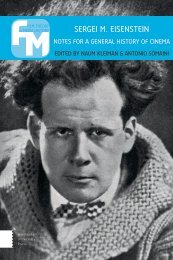ARCHITECTURE
artofinequality_150917_web
artofinequality_150917_web
You also want an ePaper? Increase the reach of your titles
YUMPU automatically turns print PDFs into web optimized ePapers that Google loves.
3.1.4<br />
the will<br />
theory of<br />
contract:<br />
procedure<br />
takes<br />
command<br />
property, forcing the borrower to sell and pay off the<br />
debt. The proceeds of the sale over and above the<br />
debt, however, went to the original owner, a remainder<br />
that was said to be his “equity” in the land. Thus<br />
by the late eighteenth century, a shift in the conception<br />
of justice can be seen in the development of<br />
mortgages: from equity as a principle of substantive<br />
fairness (referring to an absolute, universal measure<br />
of justice), to equity as a stake in capital (referring to<br />
the relative value of a financial interest). 9<br />
If customary practices were giving way to<br />
more formally privatized contractual relations, the<br />
increasing autonomy of individuals with respect to<br />
their sovereign was echoed in the way land itself<br />
was understood and used. Previously, under feudal<br />
conditions, land had been understood in terms of its<br />
capacity to sustain the peasant families (and their<br />
lords) living from it. Soil fertility, measured in the<br />
specific amount of seeding required to feed a number<br />
of families, was giving way to an abstract quality<br />
that could be compared quantitatively across vastly<br />
different contexts: the notion of geometric area and<br />
the practice of measurement (surveying) mediated a<br />
transition from the subsistence economy to the development<br />
of speculative agricultural and real estate<br />
markets. Land was becoming less important for how<br />
it could specifically sustain a particular community,<br />
and more important for how it could produce value<br />
for an anonymous market—either agriculturally<br />
(disembedding socio-ecological relationships) or in<br />
itself as a universalized territorial commodity that<br />
could be sold in the land market. 10 This shift thus<br />
made land abstract in the sense of being understood<br />
(or represented) as equal to other lands which were<br />
comparable to it only by reference to an external<br />
signifier, the price of a unit area, in a “universal”<br />
sphere, the market. 11<br />
As commodities were increasingly produced for the<br />
market, and labor sold for wages, the rise of liberal<br />
philosophy and political economy helped to configure<br />
how, and by whom, these things were to be exchanged.<br />
Toward the end of the eighteenth century,<br />
the equitable theory of contract was being displaced<br />
by a “will” theory in which the value of things being<br />
exchanged was no longer understood as being objective,<br />
as it had under substantive principles of law. 12<br />
Rather, exchanges were increasingly viewed as occurring<br />
between sovereign individuals (namely, entrepreneurs<br />
and merchants) who competitively determined,<br />
on their own, the value of their exchanges.<br />
Individuals’ subjective judgments of value were<br />
now understood and accepted as being objectively<br />
unequal: rooted in arbitrary and relative individual<br />
desires. 13 The courts began deferring to the particular<br />
terms of the contract arranged between individuals,<br />
thus neutralizing the extent of the authority and<br />
use of the Common Law tradition. Judges only ruled<br />
on the lawfulness of an exchange in cases where<br />
fraud was clearly involved. The contract became a<br />
vehicle by which individuals could “contract out” of<br />
normative straitjackets, pitting rules of commercial<br />
usage against the rule of Common Law. “Equity,”<br />
understood as fairness, was no longer a variable in<br />
judicial rulings: the contract was now sovereign, and<br />
“absolute fairness” was fragmented into the unique,<br />
localized, and incommensurable nature of each particular<br />
exchange. 14<br />
The causes for this shift from a substantive to<br />
a procedural view of the contract are simultaneously<br />
technical and philosophical. Judges recognized the<br />
diversity and complexity of commercial customs,<br />
but could not rule on them both for practical reasons<br />
(they lacked the specific know-how to decide on the<br />
technical aspects of increasingly heterogeneous and<br />
sophisticated bargains), and for ideological reasons<br />
(they preferred not to interfere with the growth of<br />
business). However, seeing the contract as an intrinsically<br />
unknowable meeting of desiring wills—the<br />
black box of commercial customs—could itself be articulated<br />
as a universal law by construing each particular<br />
commercial contract as a disaggregated chapter<br />
of universality itself. The merchants’ particularism<br />
was thus elevated to the universal: justice deferred<br />
to the exceptionalism of the merchant classes as the<br />
ostensibly natural agent of social progress. 15<br />
The radical subjectivism of contracts between<br />
private individuals, understood as the simple expression<br />
of a “meeting of minds” that cannot be predetermined,<br />
became the objective basis upon which a<br />
138 139






